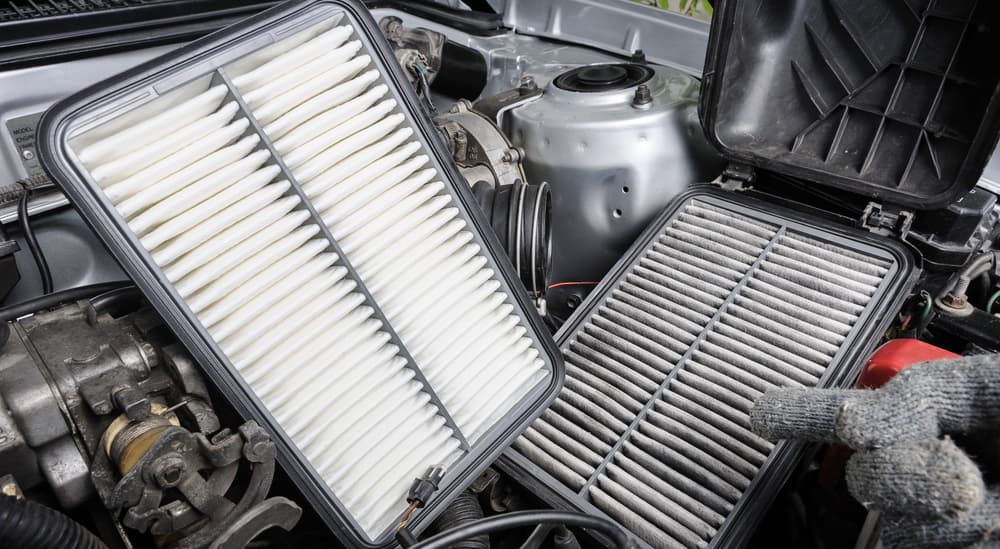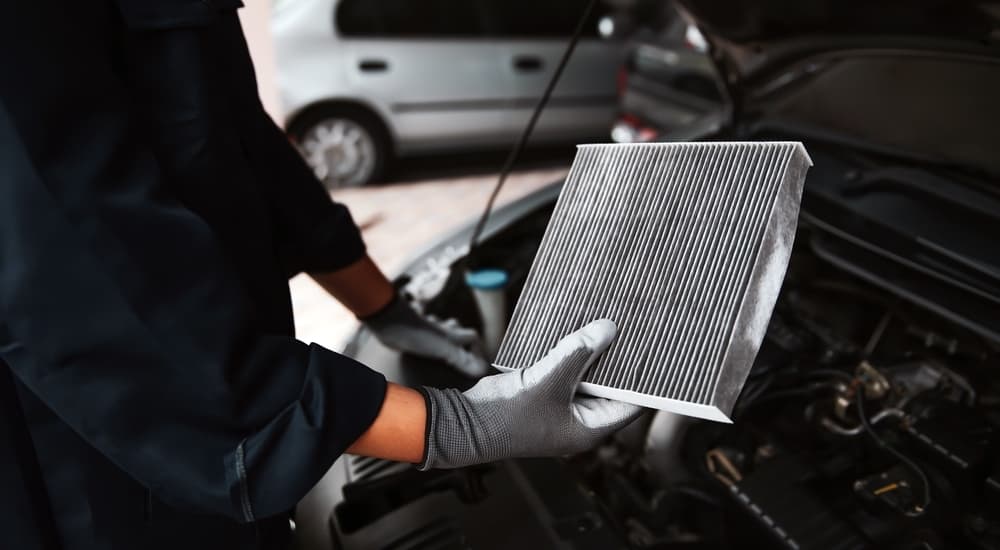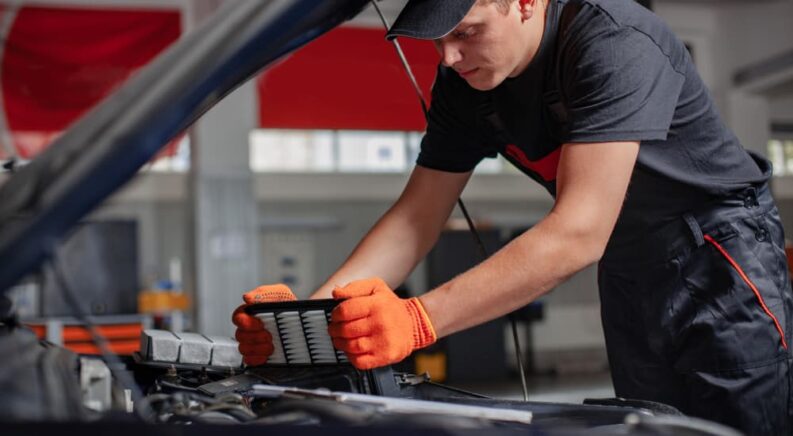Your vehicle’s engine is a finely tuned machine, and like any machine, it works best when it’s not gunked up with dirt, bugs, and other contaminants. That’s where your engine air filter comes in. Located at the start of a vehicle’s air intake system, this critical component helps to trap debris before it can make its way into the engine itself. Engine air filters have been a mainstay of automotive design since the earliest days of internal combustion, keeping the engine running smoothly by preventing large particles from entering the delicate system.
Like the filter in your vacuum cleaner or laundry machine, an engine air filter must be cleaned or replaced every so often to ensure consistent performance. This comes down to the fact that engines are designed to run on a specific fuel-to-air ratio. When an air filter gets clogged, this ratio can err too much to the fuel side of the equation as the engine struggles to draw in fresh air. The good news for any driver seeking car air filter replacement is that swapping out an air filter is one of the easiest maintenance tasks in the books. The compartment that holds the engine air filter is easily accessible and can be opened using common household tools that any DIY mechanic will have. In some cases, no tools are needed at all. How often should you change your air filter, how can you tell when it’s overdue, and what options are available on the market? We’ll explore all that and more in our guide to engine air filters.
Engine Air vs. Cabin Air
The engine air filter might be your vehicle’s most important air filter, but it’s not the only one. Every car, truck, and SUV on the road is also equipped with a cabin air filter that does for your vehicle’s interior what the engine air filter does for the engine itself. Typically located in a slot behind the glove compartment, the cabin air filter filters dust, pollen, pollution, and other contaminants before they can make their way into the vehicle’s interior. This can go a long way towards improving your overall driving experience by delivering clean, fresh air into the cabin. While it might not impact your vehicle’s overall performance, regular cabin air filter replacement is an important part of any routine maintenance schedule.
Like engine air filters, a cabin air filter should be replaced every 15,000 to 30,000 miles, or about once a year, though it all depends on your particular driving routine and the areas in which the vehicle operates. Those driving in dusty, smoggy, or otherwise polluted areas should stick to the 15,000-mile schedule, but you might be able to double that number if you’re in an area where these contaminants aren’t as much of a factor. If you forget to change your cabin air filter on time, a musty, mildew smell might be just the reminder you need. Failing to adhere to a regular cabin air filter routine can also lead to reduced airflow from the AC vents. If your vehicle isn’t pumping out heat or cool air like it once was, crack open the glove compartment and give the cabin air filter a once-over.
How Often Should It Be Replaced?
An engine air filter must be replaced regularly if you want to enjoy optimal performance. The exact schedule depends on many factors, including how often you drive and what conditions your vehicle operates in. Generally speaking, experts advise swapping out the engine air filter every 15,000 to 30,000 miles or about once every three oil changes. Those operating their vehicle under normal conditions can probably get away with replacing the engine air filter every 20,000 miles on average, but this equation can change if you’re subjecting your vehicle to a lot of pollution or choking it with dust due to frequent off-road use. In those cases, drivers might consider swapping out their engine air filter every 5,000 to 7,500 miles. It might seem overly cautious, but it can have a noticeable impact on performance if you’re the type who likes to partake in a little off-road adventure.
The type of filter you use can also impact the replacement schedule. Typical paper filters, for example, might need to be replaced every 15,000 miles, while cotton-gauze filters can provide a lengthier period of protection. Some cotton-gauze engine air filters can even be washed and reused to extend their service life, though this same trick shouldn’t be tried with a paper filter. Some manufacturers will recommend a particular type of air filter or an accelerated schedule for particular models. When in doubt, consult your owner’s manual.

How To Tell
From smells and sounds to reduced performance and the obvious Check Engine light, there are several ways to tell when your engine air filter needs to be replaced. Knowing what to look for can pay dividends when it comes to enjoying consistent, efficient engine performance, so let’s examine the warning signs and symptoms of an engine air filter that’s past its prime.
Dirty Air Filter
If you open the engine air filter housing and find a clogged, dirty air filter caked with dust, debris, and other contaminants, you’re well past due for a replacement. Some air filters can be rinsed and reused or blasted with compressed air to squeeze out a little more life, but in most cases, that’ll only delay the inevitable.
Sluggish Acceleration
When an engine isn’t getting the correct mix of fuel and clean air, reduced horsepower and performance is the first sign. If stepping on the gas pedal doesn’t result in the same level of acceleration it once did, a dirty engine air filter could be to blame. Bucking, stalling, or stumbling can be other worrying signs, so be on the lookout for any such deviations.
Poor Fuel Efficiency
When an engine isn’t getting enough clean air, it must work harder to keep things moving. This results in the engine using more gas to compensate for the lack of clean air, resulting in reduced fuel efficiency. On newer vehicles, fuel efficiency is relatively easy to track, but older models might require drivers to break out a pen and paper and do a little simple math. Regularly checking in on your vehicle’s fuel efficiency should really be a part of any driver’s routine, as it can tell you a lot about the current state of your vehicle and help you spot potential issues before they spiral out of control.
Check Engine Light
Many things can trigger the dreaded Check Engine light, including a dirty engine air filter. This will typically show up as a P0172 diagnostic trouble code (DTC) when you use an OBD-II reader. This code indicates that the engine is running too rich, which means there’s too much fuel in the air-fuel mixture.
Engine Noises
If your engine is producing a popping, coughing, or sputtering noise, you could be dealing with a clogged air filter. This noise is usually the result of an engine running too rich due to a poor fuel-to-air mixture, causing excess gas to clog the works.
Smokey Exhaust
A smokey, black cloud of exhaust emanating from your vehicle’s tailpipe is another sign of a rich fuel-to-air mixture. The dark exhaust is caused by excess fuel that isn’t burned as part of the internal combustion process. A dirty engine air filter is just one possible cause, but it’s also one of the easiest to check and should often be one of the first places you look when trying to narrow down the problem.
Fuel Smell
Finally there’s the tell-tale smell of a clogged engine air filter. Again, this comes down to a rich fuel-to-air ratio. The excess fuel will exit through the exhaust, creating a distinctive gas smell that could point to a clogged engine air filter.

Filter Types and Cost
Engine air filters come in three main varieties: paper, gauze, and foam. Each has its own pros and cons when it comes to performance, longevity, and reusability, which is why it’s so important to choose the right filter to fit your own driving style and environment. These filters generally run anywhere between $20 and $50, though performance-oriented versions can sometimes ring in a bit higher.
Paper
Paper air filters are the most affordable and basic of the three. They are incredibly common and offer decent protection, though they need to be replaced more often than gauze and foam air filters and are not reusable. While paper filters are ideal for those driving in low-pollution, low-dust areas, drivers facing more challenging conditions might consider upgrading to one of the more heavy-duty options.
Gauze
Gauze air filters not only offer improved performance when compared to paper air filters, but they can also be reused and can potentially last for as long as 100,000 miles. Gauze air filters generally come in two varieties: oiled air filters and synthetic dry air filters. Both can be cleaned and reinstalled, though oil air filters require a little more upkeep as they need to be rinsed every 5,000 miles. Synthetic dry air filters can go a little longer between cleanings, but drivers must use a special cleaning solution to remove all the built-up grime. These gauze filters are also more resistant to heat, moisture, and chemicals, which makes them ideal for high-performance vehicles.
Foam
Foam engine air filters are pretty rare in most production vehicles, but we thought we’d give a quick overview anyway. These filters are usually found on vehicles routinely exposed to highly dusty environments, like ATVs, dirt bikes, tractors, lawnmowers, and rally cars. While some drivers might consider installing them on a daily driver in areas where dirt and dust are commonly kicked up, they’re generally seen as overkill for the average passenger vehicle. Some vehicles feature a foam air filter that supplements the existing paper or gauze filter, but this doubling-up can also result in restricted air flow and performance.
A good, clean engine air filter is an important part of any gas-powered vehicle. Air filters serve as an engine’s first line of defense against dirt, debris, and other particulates from entering the engine and should never be treated as an afterthought. Regularly replacing your engine air filter will not only ensure consistent performance, but it’ll also improve fuel economy by putting less strain on your engine. As we mentioned at the start of this article, replacing your engine air filter is one of the easiest maintenance tasks you’ll come across. Considering the low price and ease of installation, there’s really no excuse for letting your engine air filter replacement schedule fall by the wayside. Remember to change the filter every 15,000 to 30,000 miles, depending on the conditions, and watch for some of the warning signs we listed above. With a little attention to detail and planning, there’s no reason why an engine air filter should ever impact your vehicle’s performance.

